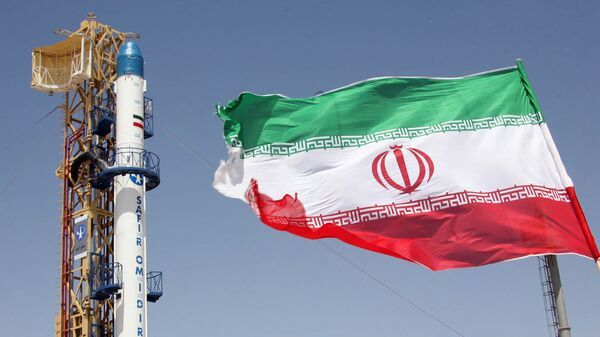Between comments made by Iranian officials and observed activity at the country’s “usually quite empty” primary launch complex, it seems Iran may be preparing to launch another satellite into orbit after it failed to do so earlier this year.
A January attempt to launch a Payam environmental monitoring satellite failed when the rocket broke apart over the Indian Ocean, Sputnik reported. A second attempt in February failed to get off the launch pad.
However, images from a US spy satellite of the Imam Khomeini Spaceport at Iran’s northern Semnan Space Center show increased activity at the site earlier this month.
"The Imam Khomeini space launch center is usually quite empty," Fabian Hinz, a researcher at the James Martin Center for Nonproliferation Studies at the Middlebury Institute of International Studies in Monterey, California, told AP. "Now we've seen pictures where you can see activities at this assembly center and something happening at the pad."
"If you put both together, it sounds very likely there's something that's going to happen," he said.
In addition, Hadi Rezaei, deputy head of research and technology at the Iranian Space Research Center, announced late last month that one new homegrown satellite was ready for launch and two more were in “final preparation,” Sputnik reported. His announcement followed April comments by Iranian Telecommunications Minister Mohammad-Javad Azari Jahromi announcing plans to launch three more satellites.
“If Iran wants to have missile activity, it’s something that it is doing openly," Jahromi said at the time. "It’s not something that is hidden. It’s part of our right to defense."
Iran’s rocketry programs have long aroused the ire of Western powers, but they are technically legal. When Iran agreed to the Joint Comprehensive Plan of Action in 2015, it signed off on severe limitations to its nuclear program that would bar its ability to develop a nuclear weapon, but agreed to no such limits on ballistic missiles, except not to try and put its non-existent nuclear weapons on them.
The UN Security Council at that time adopted Resolution 2231, in which "Iran is called upon not to undertake any activity related to ballistic missiles designed to be capable of delivering nuclear weapons, including launches using such ballistic missile technology.” However, it’s not a binding resolution.
That hasn’t stopped Washington and Tel Aviv from protesting such a launch, though. US Secretary of State Mike Pompeo threatened Iran in January to “reconsider these provocative launches and cease all activities related to ballistic missiles, in order to avoid deeper economic and diplomatic isolation.”
The fear is that the technology used to put a satellite into orbit could also be used to put a nuclear warhead on a ballistic trajectory capable of striking thousands of miles away. The US and Russia have converted many such vehicles from one duty to the other, such as the US’ Titan II intercontinental ballistic missile and Russia’s R-7 series of ICBMs.
"They're looking at these programs as not only a way to capture technologies, but they're also using them in a way that they can actually reinforce some of their different military aspects that they're dealing with," CNN military analyst retired US Air Force Col. Cedric Leighton said.
"They're trying to actually say, no matter what obstacles you put in our way, you're going to come in and you might sanction us, but those sanctions are going to be absolutely worthless because we are going to try and try again to make our weapon systems at least a regional factor, if not a global factor," he added.




